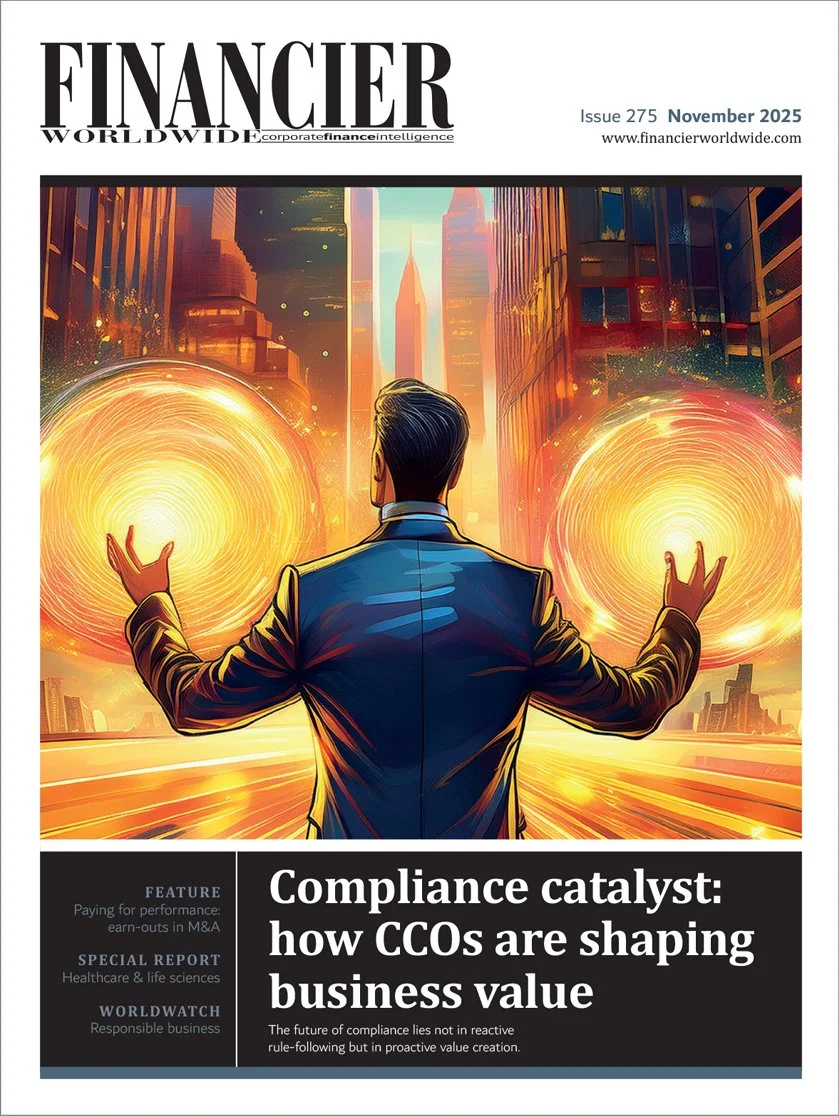Behind the curve: automating European financial services
November 2025 | FEATURE | BANKING & FINANCE
Financier Worldwide Magazine
Automation is increasingly ubiquitous. Across various sectors, it streamlines workflows, centralises data, enhances visibility and simplifies compliance, all while improving efficiency and accuracy.
Yet, some industries remain behind the curve. Financial services (FS), particularly firms operating across Europe, are still grappling with outdated processes and legacy systems that hinder progress.
According to research by Ricoh Europe, 27 percent of finance leaders across the continent cite underinvestment in automation as one of the main barriers to productivity – alongside obsolete collaboration tools and the pressure to meet ambitious growth targets.
Employees are also feeling the impact. Thirty-two percent report lacking access to essential automation tools, leaving them burdened with manual tasks that technology could easily handle. This not only diverts attention from value-adding work but also increases delays and the likelihood of human error.
Consequently, morale is suffering. Ricoh’s research identifies repetitive manual work as a key factor contributing to employee dissatisfaction, which may lead to higher turnover in roles dominated by administrative tasks.
“Automation adoption is accelerating across Europe, but it remains uneven,” says Keith Taber, senior product manager for process automation at Ricoh Europe. “While finance leaders recognise that automation brings clear benefits – less manual administration, better data accuracy and more time for strategic work – many are still being held back by tight budgets, legacy systems and other competing priorities.”
“Employees want to spend their time on work that adds value, not chasing paper or entering data,” he continues. “If businesses want to attract and retain top finance talent, automating routine work must be part of the plan.”
“Automation offers more than just streamlined workflows; it promises a future where finance teams are empowered, data is trusted and strategic decisions are made with confidence.”
Encouragingly, 34 percent of finance leaders say they are prioritising investments in tools that help staff work more efficiently, compared with the previous year.
E-invoicing mandates
In addition to modernising systems and improving employee engagement, finance leaders must also prepare for incoming e-invoicing mandates across several European markets – regulations that carry financial penalties if ignored.
Following its 2023 VAT Gap Report, the European Commission adopted the VAT in the Digital Age (ViDA) package in March 2025. This legislation will be rolled out progressively until 2035 and includes provisions for mandatory e-invoicing under certain conditions. It also introduces enhancements to the Import One Stop Shop framework and digital reporting requirements for cross-border business to business (B2B) transactions from July 2030.
EU Directive 2014/55/EU, originally focused on public procurement, is being expanded to cover B2B payments. Member states are setting their own deadlines for compliance. Germany, for instance, began enforcing its mandate in January 2025, requiring businesses to be able to receive structured electronic invoices compliant with the EU standard EN 16931. Spain and France are expected to follow by September 2026.
“E-invoicing mandates have already been adopted in several European markets, which cannot be ignored if organisations want to avoid financial penalties,” warns Mr Taber. “Germany enforced its own as of January 2025, with Belgium and France following suit by 2026. This will also affect organisations operating cross-border, as they will need to comply with e-invoicing rules to trade within the EU.”
Ready to act
Financial automation has become a necessity. The expectation is growing that FS firms will modernise their systems to meet both operational and regulatory demands.
“Finance leaders are ready to act, but their confidence varies depending on how modern their current systems are and how well their finance and IT teams are coordinated,” asserts Mr Taber. “Legacy platforms, siloed ownership and integration concerns are still common hurdles.”
The need for modernisation extends beyond regulatory compliance. “For many organisations, legislative mandates are shining a light on longstanding inefficiencies in finance systems – from fragmented tools and patchy integration to a lack of visibility across core processes,” explains Mr Taber. “Many still rely on manual processes and legacy software.”
Nonetheless, Ricoh Europe’s research indicates a shift in mindset. Increasingly, finance leaders view automation not merely as a compliance requirement but as a strategic tool to build resilience, enhance team satisfaction and unlock long-term value.
“The next 12 to 18 months will be pivotal,” believes Mr Taber. “Those organisations that move early will be in a strong position – not only to meet regulatory deadlines, but ultimately to transform how their finance function operates.”
As the pace of regulatory change accelerates and the pressure to modernise intensifies, FS firms across Europe face a defining moment. With automation now a strategic imperative, those that continue to rely on outdated systems and manual processes risk falling behind, not only in terms of compliance but also in attracting and retaining talent, maintaining operational efficiency and delivering long-term value. The organisations that embrace automation now will be better equipped to navigate the complexities of cross-border regulation, respond to evolving market demands and build more resilient finance functions.
The next chapter for European FS will be written by those willing to invest in transformation. Automation offers more than just streamlined workflows; it promises a future where finance teams are empowered, data is trusted and strategic decisions are made with confidence. The question is not whether to automate, but how quickly and effectively it can be done.
© Financier Worldwide
BY
Fraser Tennant


